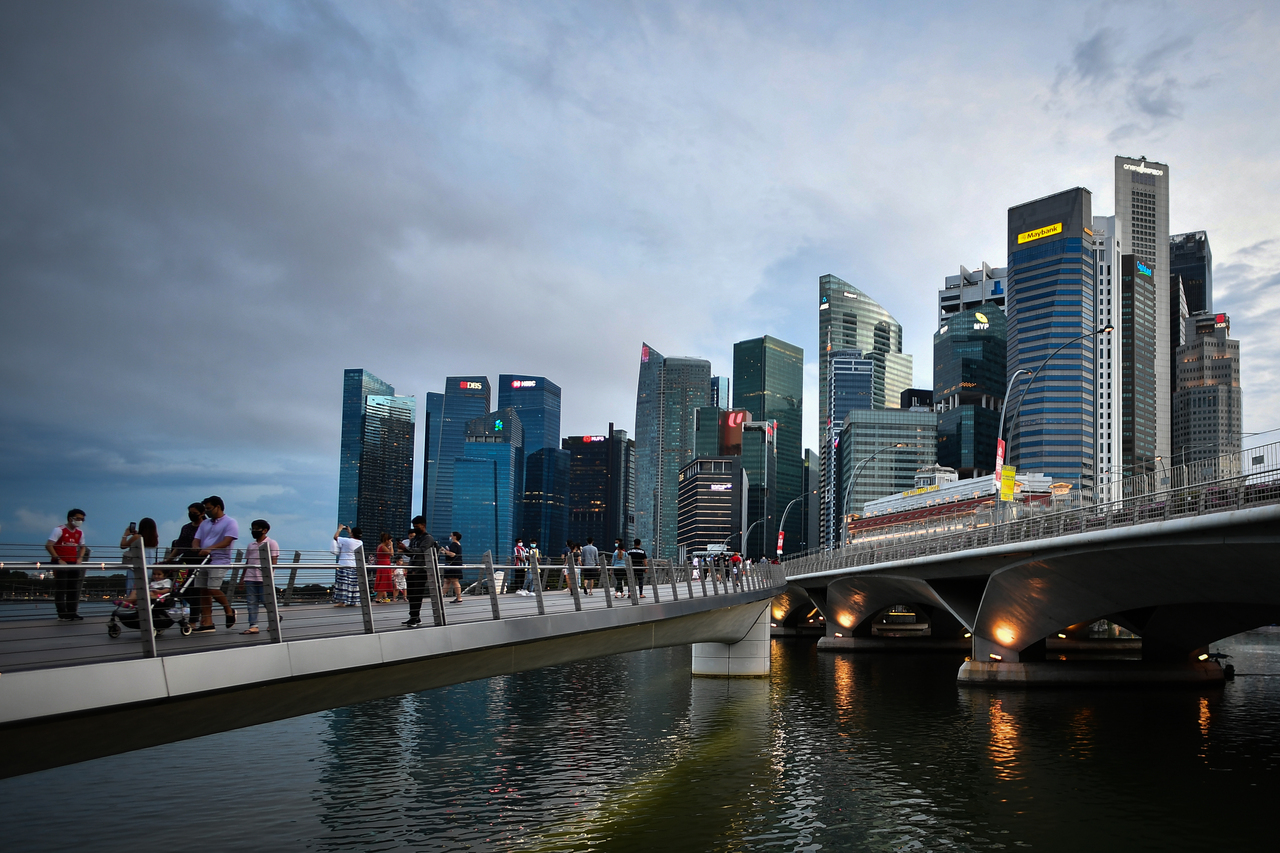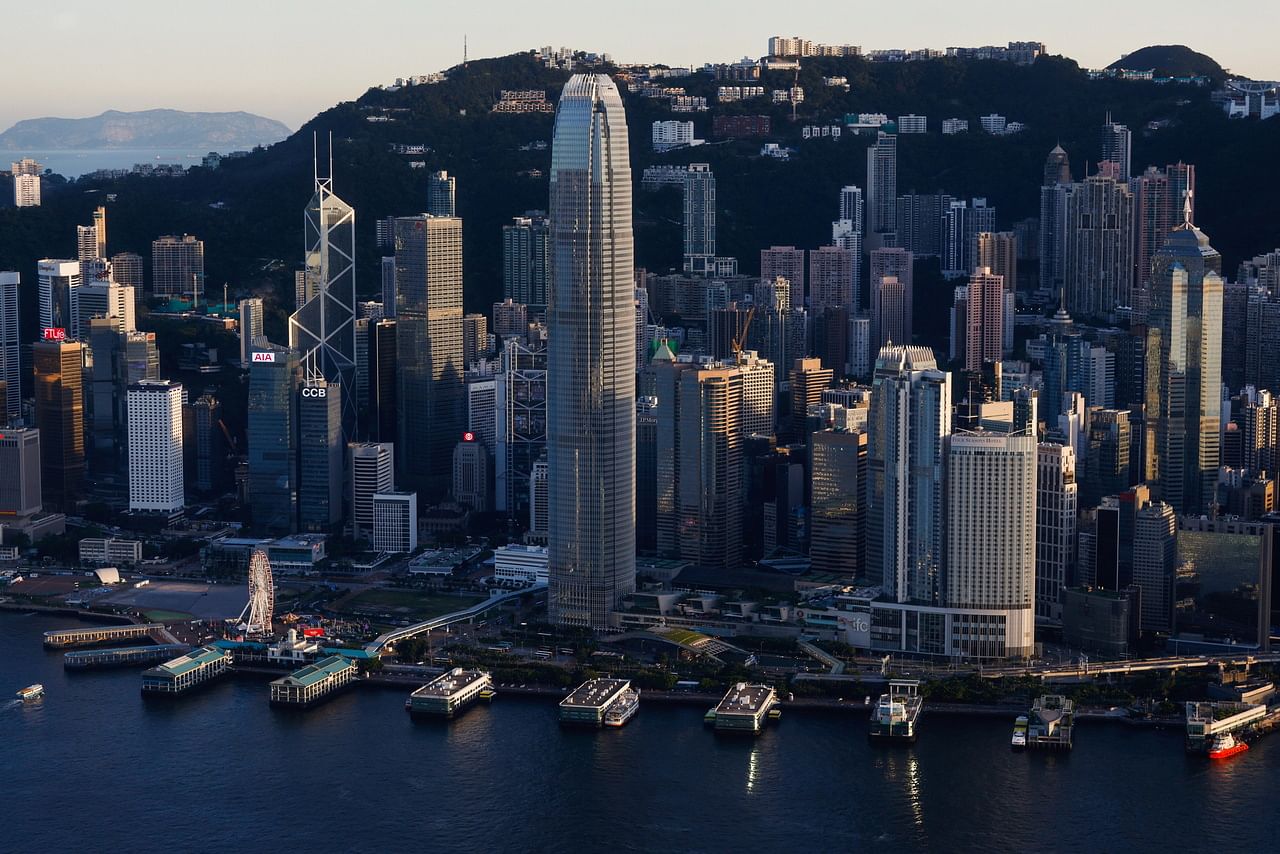Singapore may gain economic edge over Hong Kong from diverging Covid-19 strategies
Sign up now: Get ST's newsletters delivered to your inbox

Singapore will gradually open its borders and avoid stringent containment measures, which should boost economic activities.
ST PHOTO: LIM YAOHUI
Follow topic:
SINGAPORE - Singapore's plan to live with the pandemic will be closely watched in the coming weeks.
If the Republic's healthcare system is able to cope with the rising number of Covid-19 infections, economists say the next move will be opening up borders to foreign talent.
This would boost Singapore's attractiveness as a trade and investment hub in the region and raise the city's appeal as an alternative location for companies to set up their headquarters at a time when rival Hong Kong is showing signs of recovery, said Ms Tring Nguyen, Asia-Pacific senior economist at Natixis.
Hong Kong is catching up with Singapore's pace of expansion for the first time since 2008, with GDP increasing 7.6 per cent in the second quarter over the same period a year ago.
Economists polled by Bloomberg last week raised their growth forecasts for Hong Kong by 0.7 percentage point to 6.7 per cent this year, while the Singapore economy is expected to expand between 6 and 7 per cent.
Mr Dong Chen, senior Asia economist at Hong Kong-based Pictet Wealth Management, said the different Covid-19 strategies pursued by the two governments will determine each city's economic performance in the coming months.
While Hong Kong's zero-Covid-19 strategy has so far been successful in keeping the case count low, overseas travel is costly and sometimes impossible.
In contrast, Singapore will gradually open its borders and avoid stringent containment measures, which should boost economic activities.
Mr Tan Lee Hock, founder of Hong Kong-based investment journal Asia Asset Management, said some businesses there are mulling over a move to Singapore, where business travel is more amenable.
Mr David Wang, chief China economist at Credit Suisse, said Singapore will enjoy an advantage over Hong Kong if it is able to ease entry restrictions for overseas talent without triggering a resurgence in Covid-19 casualties . "For now, it appears that Singapore is ahead of Hong Kong along this dimension."
Mr Chen added that the Republic has "a much more diversified economic structure, with manufacturing being a meaningful part of the economy, whereas Hong Kong almost fully relies on services".
As it stands, international confidence in Singapore continues to "stay strong despite the Covid-19 risks", with fixed asset investments (FAI) still flowing in at a healthy pace, said UOB economists Barnabas Gan and Ho Woei Chen.
The pair added that digitalisation will continue to encourage the development of new technologies and advanced manufacturing adoption in Singapore, while some healthcare companies are also expected to scale up their production capacities for diagnostic test kits and vaccines here.
Last year, Singapore attracted a $17.2 billion in FAI, exceeding the Government's target of $8 billion to $10 billion.
Mr Devin Harree, South-east Asia economist at Credit Suisse, said foreign investment decisions also depend on a range of factors such as political stability, rule of law and infrastructure where Singapore scores highly, "suggesting it should be able to maintain its role as a leading trade and investment hub".
But there are downsides to Singapore's strategy of living with the pandemic. "China does not like it, so opening up with China will take longer," said Natixis' Asia-Pacific chief economist Alicia Garcia Herrero.
Mr Wang said there is a strong probability that Hong Kong will benefit from China's zero-Covid-19 policies. For example, a larger number of Chinese companies are expected to list in Hong Kong compared with other financial centres.
Mr Tan of Asia Asset Management said Hong Kong should continue to be "the premier hub for mainland IPOs; more so now given the impending exodus of Chinese firms from the US".

<p>A general view of Two International Finance Centre (IFC), HSBC headquarters and Bank of China are seen in Hong Kong, China July 13, 2021. REUTERS/Tyrone Siu</p>
PHOTO: X02605
On the asset management front, "there is no question that global managers will want to expand their activities in China", Mr Tan said.
He added that top fund managers and investment banks such as Blackrock and Goldman Sachs have offices in Hong Kong or China. "More will set up shop in the coming months and years as China is the only major market for all of them now to secure long-term growth."
Mr Gan and Ms Ho from UOB added that business activities and investment flows in Hong Kong are supported by the Guangdong-Hong Kong-Macau Greater Bay Area (GBA) development plan.
"The various Chinese cities have different specialisations and thus unique roles to play within the GBA. This means that Hong Kong's importance as a financial hub will remain for some time."

